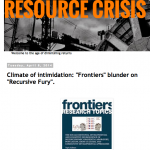Frontiers Journal
Henry Markram
Henry Markram, a chief editor at Frontiers, the journal that recently retracted (resulting in multiple resignations of editors from that journal), inappropriately, an important paper on climate change denialism, just made the following comment on a post on that journal's blog.
My own personal opinion: The authors of the retracted paper and their followers are doing the climate change crisis a tragic disservice by attacking people personally and saying that it is ethically ok to identify them in a scientific study. They made a monumental mistake, refused to fix it and that…
Yesterday, Ugo Bardi resigned his editorship at Frontiers Journal over the Recursive Fury Fiasco. Today, a second editor has done so as well.
You should go read the original post, but here's a key part of it:
Frontiers retracted a perfectly fine (according to their own investigation) psychology paper due to financial risks for themselves. It can only be seen as at best a rather lame excuse or at worst rather patronizing, if Frontiers were to claim to be protecting their authors from lawsuits by removing the ‘offending’ article. This is absolutely no way to “empower researchers in their daily…
Ugo Bardi is a scientist who until a few moments ago served as Chief Specialty Editor at the journal Frontiers. As you know, Frontiers has recently retracted a perfectly good paper, initially indicating that the retraction was due to pressure from the climate science denialist community, who did not like the paper because it was about them. Later, Frontiers changed its tune and claimed that the paper was retracted because of ethical violations of the authors, even though the journal had earlier clearly stated that there were no issues, ethical or otherwise, with the paper. I talk about…
Recently, the OpenAccess journal Frontiers retracted a paper written by Stephan Lewandowsky, John Cook, Klaus Oberauer, and Michael Marriot Hubble called “Recursive fury: Conspiracist ideation in the blogosphere in response to research on conspiracist ideation.” The paper discussed conspiracist ideation as implicated in the rejection of scientific work …
A recent study involving visitors to climate blogs found that conspiracist ideation was associated with the rejection of climate science and the rejection of other scientic propositions such as the link between lung cancer and smoking, and…



